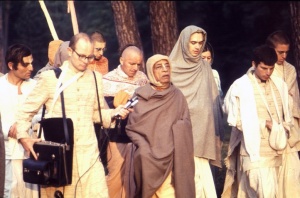SB 6.9.11: Difference between revisions
m (1 revision(s)) |
(Vanibot #0054 edit - transform synonyms into clickable links, which search similar occurrences) |
||
| (One intermediate revision by one other user not shown) | |||
| Line 1: | Line 1: | ||
{{info | {{info | ||
|speaker= | |speaker=Śukadeva Gosvāmī | ||
|listener= | |listener=King Parīkṣit | ||
}} | }} | ||
[[Category:Srimad-Bhagavatam - Canto 06 Chapter 09]] | |||
[[Category:Bhagavatam Verses Spoken by Sukadeva Gosvami - Vanisource|060911]] | |||
<div style="float:left">'''[[Srimad-Bhagavatam]] - [[SB 6|Sixth Canto]] - [[SB 6.9: Appearance of the Demon Vrtrasura|Chapter 9: Appearance of the Demon Vṛtrāsura]]'''</div> | |||
<div style="float:right">[[File:Go-previous.png|link=SB 6.9.10]] '''[[SB 6.9.10]] - [[SB 6.9.12]]''' [[File:Go-next.png|link=SB 6.9.12]]</div> | |||
{{RandomImage}} | |||
==== TEXT 11 ==== | ==== TEXT 11 ==== | ||
<div class="verse"> | |||
<div | :hata-putras tatas tvaṣṭā | ||
hata-putras tatas tvaṣṭā | :juhāvendrāya śatrave | ||
juhāvendrāya śatrave | :indra-śatro vivardhasva | ||
indra-śatro vivardhasva | :mā ciraṁ jahi vidviṣam | ||
mā ciraṁ jahi vidviṣam | |||
</div> | </div> | ||
| Line 17: | Line 22: | ||
==== SYNONYMS ==== | ==== SYNONYMS ==== | ||
<div class="synonyms"> | |||
<div | ''[//vanipedia.org/wiki/Special:VaniSearch?s=hata&tab=syno_o&ds=1 hata]-[//vanipedia.org/wiki/Special:VaniSearch?s=putraḥ&tab=syno_o&ds=1 putraḥ]'' — who lost his son; ''[//vanipedia.org/wiki/Special:VaniSearch?s=tataḥ&tab=syno_o&ds=1 tataḥ]'' — thereafter; ''[//vanipedia.org/wiki/Special:VaniSearch?s=tvaṣṭā&tab=syno_o&ds=1 tvaṣṭā]'' — Tvaṣṭā; ''[//vanipedia.org/wiki/Special:VaniSearch?s=juhāva&tab=syno_o&ds=1 juhāva]'' — performed a sacrifice; ''[//vanipedia.org/wiki/Special:VaniSearch?s=indrāya&tab=syno_o&ds=1 indrāya]'' — of Indra; ''[//vanipedia.org/wiki/Special:VaniSearch?s=śatrave&tab=syno_o&ds=1 śatrave]'' — for creating an enemy; ''[//vanipedia.org/wiki/Special:VaniSearch?s=indra&tab=syno_o&ds=1 indra]-[//vanipedia.org/wiki/Special:VaniSearch?s=śatro&tab=syno_o&ds=1 śatro]'' — O enemy of Indra; ''[//vanipedia.org/wiki/Special:VaniSearch?s=vivardhasva&tab=syno_o&ds=1 vivardhasva]'' — increase; ''[//vanipedia.org/wiki/Special:VaniSearch?s=mā&tab=syno_o&ds=1 mā]'' — not; ''[//vanipedia.org/wiki/Special:VaniSearch?s=ciram&tab=syno_o&ds=1 ciram]'' — after a long time; ''[//vanipedia.org/wiki/Special:VaniSearch?s=jahi&tab=syno_o&ds=1 jahi]'' — kill; ''[//vanipedia.org/wiki/Special:VaniSearch?s=vidviṣam&tab=syno_o&ds=1 vidviṣam]'' — your enemy. | ||
hata- | |||
</div> | </div> | ||
| Line 25: | Line 29: | ||
==== TRANSLATION ==== | ==== TRANSLATION ==== | ||
<div class="translation"> | |||
<div | |||
After Viśvarūpa was killed, his father, Tvaṣṭā, performed ritualistic ceremonies to kill Indra. He offered oblations in the sacrificial fire, saying, "O enemy of Indra, flourish to kill your enemy without delay." | After Viśvarūpa was killed, his father, Tvaṣṭā, performed ritualistic ceremonies to kill Indra. He offered oblations in the sacrificial fire, saying, "O enemy of Indra, flourish to kill your enemy without delay." | ||
</div> | </div> | ||
| Line 32: | Line 35: | ||
==== PURPORT ==== | ==== PURPORT ==== | ||
<div class="purport"> | |||
There was some defect in Tvaṣṭā's chanting of the ''mantra'' because he chanted it long instead of short, and therefore the meaning changed. Tvaṣṭā intended to chant the word ''indra-śatro'', meaning, "O enemy of Indra." In this ''mantra'', the word ''indra'' is in the possessive case (''ṣaṣṭhī''), and the word ''indra-śatro'' is called a ''tat-puruṣa'' compound (''tatpuruṣa-samāsa''). Unfortunately, instead of chanting the ''mantra'' short, Tvaṣṭā chanted it long, and its meaning changed from "the enemy of Indra" to "Indra, who is an enemy." Consequently instead of an enemy of Indra's, there emerged the body of Vṛtrāsura, of whom Indra was the enemy. | |||
</div> | |||
<div | <div style="float:right; clear:both;">[[File:Go-previous.png|link=SB 6.9.10]] '''[[SB 6.9.10]] - [[SB 6.9.12]]''' [[File:Go-next.png|link=SB 6.9.12]]</div> | ||
__NOTOC__ | |||
</div> | __NOEDITSECTION__ | ||
__NOTOC__ | |||
Latest revision as of 22:46, 18 February 2024

A.C. Bhaktivedanta Swami Prabhupada
TEXT 11
- hata-putras tatas tvaṣṭā
- juhāvendrāya śatrave
- indra-śatro vivardhasva
- mā ciraṁ jahi vidviṣam
SYNONYMS
hata-putraḥ — who lost his son; tataḥ — thereafter; tvaṣṭā — Tvaṣṭā; juhāva — performed a sacrifice; indrāya — of Indra; śatrave — for creating an enemy; indra-śatro — O enemy of Indra; vivardhasva — increase; mā — not; ciram — after a long time; jahi — kill; vidviṣam — your enemy.
TRANSLATION
After Viśvarūpa was killed, his father, Tvaṣṭā, performed ritualistic ceremonies to kill Indra. He offered oblations in the sacrificial fire, saying, "O enemy of Indra, flourish to kill your enemy without delay."
PURPORT
There was some defect in Tvaṣṭā's chanting of the mantra because he chanted it long instead of short, and therefore the meaning changed. Tvaṣṭā intended to chant the word indra-śatro, meaning, "O enemy of Indra." In this mantra, the word indra is in the possessive case (ṣaṣṭhī), and the word indra-śatro is called a tat-puruṣa compound (tatpuruṣa-samāsa). Unfortunately, instead of chanting the mantra short, Tvaṣṭā chanted it long, and its meaning changed from "the enemy of Indra" to "Indra, who is an enemy." Consequently instead of an enemy of Indra's, there emerged the body of Vṛtrāsura, of whom Indra was the enemy.